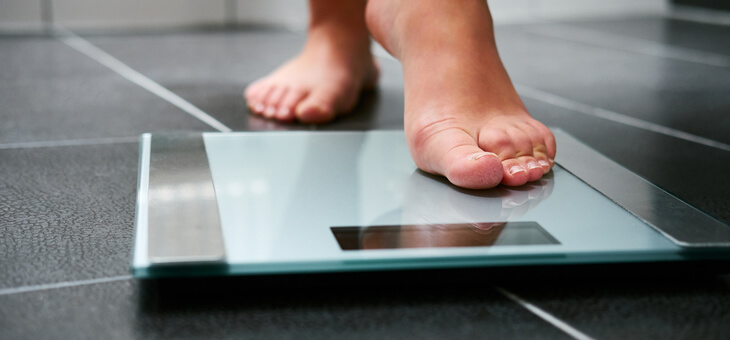Many of us will have put losing weight on our New Year’s resolution lists, and one of the keys to weight loss success is being able to track your results accurately. Is there a time of day to weigh yourself that’s best for getting an accurate reading?
As you may be painfully aware, your weight can fluctuate over time. But did you know it can fluctuate even over the course of single day?
Standing on the bathroom scales in the morning can give you a different reading than in the evening. If you’re trying to lose weight, then you’re going to need readings that most accurately reflect where you’re at on your journey.
As a rule of thumb, weighing yourself first thing in the morning will yield the most accurate results. You’ve been asleep for hours and haven’t eaten or had anything to drink yet. Experts recommend using the toilet before your weigh-in to get rid of excess fluids for an even more accurate reading.
Read: A weight loss solution that helps men lose weight – and keep it off
You might think defecating would drop your weight – and it does – but not significantly, especially when compared to the weight of the fluids that have built-up overnight.
Over the course of the day, your weight will rise and fall as you eat and drink and also as you exercise (or don’t).
Unsurprisingly, eating and drinking increases your weight throughout the day. If you’re not using the loo enough, or not exercising, then your weight will increase with each thing you consume. So weighing yourself in the evening will give you the highest reading of the day.
But it’s not entirely accurate, as your body will process this food and drink through the night, and it’s the net loss (or gain) that you get the morning after that tells you whether or not you’re on track.
Read: Things not to say to someone on a weight loss journey
Exercising can have a big impact on your hour-to-hour weight fluctuations. Although weight loss at its core involves burning more calories than you are consuming, weighing yourself immediately after a workout or run will most likely give you your lowest reading of the day.
But rather than representing a calorie deficit, the low weight is mostly due to the water you’ve lost through sweating. This weight will quickly return when you drink water to replenish the lost sweat.
If you’re trying to lose weight, many experts say weighing yourself daily is not always the best course of action, and that weekly weigh-ins are best.
“Once a week is reasonable,” nutritionist Melissa Meier told 9Honey.
“Do it at the same time of day, same time of week, to be consistent and reliable.”
Read: The diet that’s best for weight loss and cholesterol
But she says when it comes to weight loss, putting too much stock in the numbers on the scale can ultimately be detrimental to your health goals.
“We’re far more than just a number on the scales, and fixating on [weight] can be really unhealthy,” Ms Meier says.
“It’s much more important to focus on building healthy habits – making sure you’re eating nutritious foods and doing enough exercise and taking care of your emotional and mental wellbeing.”
Are you trying to lose weight in 2022? How often do you get on the scales? Let us know in the comments section below.
If you enjoy our content, don’t keep it to yourself. Share our free eNews with your friends and encourage them to sign up.

